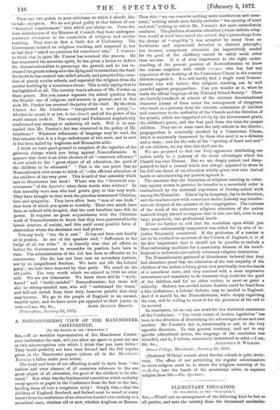A NONCONFORMIST VIEW OF THE MANCHESTER CONFERENCE.
(TO THE EDITOR OF THE "SPECTATOR:]
SIR,—If no worthier representative of the Manchester Confer- ence undertakes the task, will you allow me space to point out one or two misconceptions into which I think that you have fallen ? They would probably not have been formed had the full reports given in the Manchester papers (above all in the Manchester Examiner) fallen under your notice.
The head and front of our offending is said to have been "the curious and utter absence of all conscious reference to the one great object of all education, the good of the children to be edu- cated." But what was the fundamental conviction which underlay every speech or paper in the Conference from the first to the last, binding them all into a congruous unity? Simply this,—that the children of England, Scotland, and Ireland must be saved at every hazard from the misfortune of an education handed over entirely to a sacerdotal caste, whether old or new, whether Anglican or Roman.
Than this "we can conceive nothing more mischievous and unna- tural," nothing which more fatally excludes "the opening of heart and soul," nothing to which Mr. Forster's Act more immediately conduces. The platform of secular education (whose definite adop- tion would of itself have saved the second day's proceedings from the charge of " stupidity ") was accepted by many from no doctrinaire and unpractical devotion to abstract principle ; but because compulsory education (so imperatively needed for the good of the children) cannot be safely made other than sec ular. It is of vital importance to the right under- standing of the present position of Nonconformists to know the intense suspicion with which everyone who has had any experience of the working of the Conscience Clause in the country districts regards it. You will hardly find a single rural Noncon- formist who will believe that religious teaching can be well guarded against propagandism. Can you wonder at it, when he reads the official language of the National School Society ? There are literally hundreds of schools of the strictest denominational character (many of them under the management of clergymen who teach as a primary duty the absolute submission of intellect and conscience to the authority of the Church and the direction of the priest), which are supported wholly by the Government grant, the children's pence, and the fees paid from the rates for pauper children. They are in most cases the only schools in the district ; propagandism is nominally checked by a Conscience Clause, which is universally denounced by those who need it as a delusion and a sham ; and for the sake of the "opening of heart and soul" of our children, we say that this shall not be.
We are prepared to find our Tory opponents attributing our action solely to a jealousy of the social advantages which the Church has over Dissent. But we are deeply pained and disap- pointed to find a journal which has always appeared to share to the full our dread of an education wholly given over into clerical hands so misconceiving our protest against it.
The assertion that the limitation of religious teaching to volun- tary agency means in practice its transfer to a sacerdotal order is contradicted by the universal experience of Sunday-school work among the Dissenters. This is lay in its agency, lay in its direction, and the teachers view with sometimes undue jealousy any interfer- ence on the part of the minister of the congregation. The vastness of the work of the voluntary religious education of the nation makes it simply absurd to suppose that it can ever fall, even in any large proportion, into professional hands.
Allow inc further to add that the resolution upon which you have most unfavourably commented was called for by acts of in- justice frequently committed. If the profession of a teacher is not to be confined to members of the Church of England, it is of the first importance that it should not be possible to exclude a Nonconforming candidate for a mastership because of his unwil- lingness to undertake (so-called) voluntary religious instruction.
The Nonconformists gathered at Manchester believed that they had abundant proof that the education of the vast majority of the children of the nation is being given over practically into the hands of a sacerdotal caste, and they resolved with a most impressive earnestness and unanimity to do whatever they could for the good of the children, and for no other motive, to avert so great a calamity. Sadowa was needed before Austria could be freed from a like misfortune ; a Liberal Sadowa may be needed in England. And if it should be, the Nonconformists, while deeply regretting the cost, will be willing to incur it for the greatness of the end to be secured.
In conclusion, let me say one word for the historical conscience of the Conference. "The whole course of modern legislation" has been in the direction of diminishing the advantages of one sect over another. Mr. Forster's Act is, intentionally or not, in the very opposite direction. To this general tendency, and not to any specific educational action, the language of the resolution was intended, and is, I believe, universally understood to refer.—I am, Sir, &c., AUGUSTUS S. WILKINS. Owens College, Manchester, January 29, 1872.
[Professor Wilkins' remark about Sunday schools is quite irrele- vant. The effect of not permitting the regular schoolmasters to teach religion must be to throw the religious teaching of the week-day into the hands of the ministerial order, to separate religion from life.—En. Spectator.






































 Previous page
Previous page